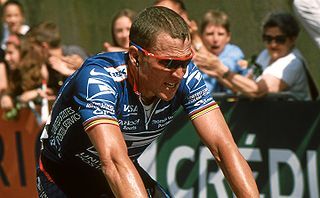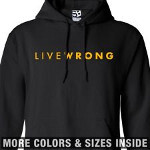Go ahead, do whatever you want. With apologies to my brother ("I can do whatever want" = False): You can do whatever you want. You can mix and match different suits of armor if you want to. You can eat lots of ice cream, post stupid things on twitter, tattoo your girlfriend's name on your body; you can do whatever you want -- but then you have to face the consequences. How do we live so that we don't end up apologizing to the world on the Oprah Winfrey show? Here are three principles to keep in mind.
Principle #1: Actions have Consequences
Actions have Consequences. Good choices have good consequences; bad choices have bad consequences. This is the most important rule we can learn as children. We seem to naturally own the positive consequences and then make excuses for the negative ones. You get an "A" on an assignment and immediately we congratulate ourselves. You get a "C" and we try to blame the teacher or our Mom or the test was too hard, etc. Only when we start accepting all the consequences, both good and bad, do we begin to realize we can control our lives by the choices we make.
Here's one quick example:
In my first priestly assignment, I had a suite to myself (bedroom, study, bathroom), and it was always messy. The desk would fill up, then the floor, then I would start piling piles on top of each other to make room for more stuff. I would eventually tackle the piles when they got too big, but I hated the mess. Finally it dawned on me, "I'm the only one who uses these rooms. If the rooms are messy, it's my fault." I started to watch myself closer and realized that I would come home tired and dump my stuff thinking, "I'll get to that later." Later never comes. I started disciplining myself to organize things immediately, not later, and the problem went away.
Principle #2: You get to choose Actions but you have to accept ConsequencesWe like to think that we have control over everything, but we do not. We only have control over the choices we make. Consequences flow from those choices. We must accept and take responsibility for all the consequences that flow from our choices, even the unintended consequences. If we don't like the consequences, we have to make new choices to influence them.
Example:
I subscribed to the local newspaper because I like to know what is going on but also to support traditional news media. As a consequence, I have to make payments every month. What do I do with all the old newspaper, especially ones that I didn't read because I didn't have the time? Do I save them, recycle them, burn them, use them for wrapping paper? I never thought of it being a problem. Now I have to make a new choice to deal with the consequences of the first choice.
Another example:A young girl contemplates using the "morning after" pill. "Last night we were drinking, one thing led to another, and long story short, I'm afraid I could be pregnant." Natural consequence of her previous choices. What she really wants is a do-over, but the "morning after" pill is not a do-over. It's a new choice with a whole new set of consequences. If she won't accept the possible consequences of the first bad choice (pregnancy, STD's, a boyfriend who wants more), is she truly prepared to face the possible consequences of a new bad choice (a very early abortion)? What she really needs to realize is that the the real bad choices were made much earlier that night. She chose to drink to excess and then be alone with a man she wasn't married to (socially acceptable bad choices, and so harder to see as bad), and these bad choices had as a consequence a further bad choice (sex). If she doesn't like these consequences, she needs to work backwards and re-evaluate her lifestyle choices.
Lance Armstrong, an anatomy of Choices and Consequences
A relevant example of these first two principles is Lance Armstrong. Many know that Lance was a Stage 3 cancer survivor who went on to win a record 7 consecutive Tour de France victories. He made a lot of money, built a foundation, and his LIVESTRONG Nike campaign was very successful. He was also frequently accused of doping (using banned performance-enhancing drugs), charges which he vehemently denied. Until January 14th, when he publicly confessed on the Oprah Winfrey show that he had used performance enhancing drugs (EPO, Cortisol, Testosterone, and blood doping) to win all 7 of his victories. By that point, the USADA had already investigated and declared Armstrong and his teammates, "ran the most sophisticated, professionalized and successful doping program that sport has ever seen." He was stripped of his victories and banned from cycling.
Originally, he chose to use performance enhancing drugs to win a few stages of the Tour. There was a culture of doping in cycling because, if you were careful, it was unlikely that you would be caught. Anecdotal evidence suggests that most everyone was doing it. Still, Lance claimed he wasn't pressured to do it: He chose to cheat. As a consequence he won a few stages and eventually a Tour, then more, and then seven. Further consequences meant he was famous, he took millions in sponsorship money and inspired millions of fans and supporters.
Now, the immediate consequences of doping were being banned from cycling and disgraced. To avoid those consequences, Lance chose to lie about his doping. Eventually people accused him of doping and lying and he sued them and won. More bad choices. The consequences continued to follow him until he could no longer escape the avalanche. After so many years of lying, even his "come clean" interview contained lies. He cheated his competitors, his supporters, and cancer survivors everywhere who saw him as a hero. Sponsors want their money back, supporters want their loyalty back, his detractors want another lawsuit, and the Tour wants its trophies back. Actions have consequences; bad actions have bad consequences; very bad actions have very bad consequences. But in the end, the real victim is Lance Armstrong. By choosing to dope, he cheated himself out of a life well lived. Had he "stayed clean" in the beginning, he may have never become rich or famous, but he would have been a fine human being. Instead, he has shaped himself into a cheat and a liar. That brings me to my third and final principle.
Principle #3: Your choices shape You
The truth is, we are looking on the wrong end of the chisel. Our choices are shaping our world, but more importantly, every choice I make changes me. Each choice individually may not be very important, but taken together over time, every choice begins to shape me into a certain kind of person. I choose not just the kind of of things I do; my actions choose the kind of person I become.
My brother very wisely points out that we are trying to engineer a way to make bad choices but not have to face the consequences:
- “I want to eat ice cream, but I don’t want to get fat”
- “I want high government services but I want my tax rate to be low”
- “I want to spend like a drunken sailor and still have financial security”
- “I want to do bad things, but I don’t want anyone to think I’m a bad person”
- “I want to sleep with someone, but I don’t want any pregnancy”
- “I want to look at pornography on www.watchmygf.sex but I don't want to hurt my wife"
Again, many guys feel that a glance now and again at women on websites like https://www.hdpornvideo.xxx/ is not "such a bad thing." But do you want to be the kind of man who cheats on his wife with internet pictures? Do you want to be the kind of man who turns to porn when he is stressed? Each choice is shaping you into that kind of man.
Sow a thought and you reap an action; sow an act and you reap a habit; sow a habit and you reap a character; sow a character and you reap a destiny.
Use the Law of Consequences to your BenefitThere's still hope. If you don't like the kind of person who have become, make new choices. No matter how long and deep you have made your bad choices, you can always begin to choose differently. If you don't like how messy your house is, start making new choices. If you don't like your weight, decide on little choices to improve it. It is not easy to reverse years of bad choices, but each act you sow begins to reap new habits.
Here's another way to look at things. Every morning I get up and worry about all the things that I have to do that day. I also worry about the random phone calls, the change-of-plans, and the potential tragedies that might face me. I shouldn't be worried about those things because I have very little control over them. Instead, the question I need to ask myself is this: What kind of priest do I want to be today? Do I want to react to stress by getting angry? Do I want to frustrate my staff or hide from my responsibilities? Or do I want to be compassionate and patient in the midst of struggles? I think of the kind of person I want to be and then I try to make patient, compassionate choices that are consistent with who I want to be. Eventually, slowly and painfully, my choices will shape me into the person I choose to be. [because I don't want to be the kind of person who plagiarizes, the thumbnail images above is from sportslinkup.com]
Every day you will face choices. The world is interrogating you with the same question over and over again: Who are you? What kind of person are you? You answer with your choices. The choices build habits that build character, but over and over again you face new problems and answer them with new choices. Every time you make a choice, you hold your life in your hands and you shape that life. Choose wisely.
Example
In the recent movie version of Les Miserables, the character of Jean Valjean (played by Hugh Jackman), is branded as a thief. But he gets a chance to start over and chooses to be a good man instead. The entire rest of the movie, his resolve to be a good man is challenged and tested by the circumstances of life. As he continues to be challenged, he answers more firmly and with more conviction (he builds new habits that lead to a new character). Finally, as he lays dying, the girl Cosette names it: He has become not just a good man but a great man: Jean Valjean has become a saint.
You can do whatever you want. But beware: Actions have consequences. They shape who we are. What kind of person are you? What kind of person are you becoming? Most importantly, what kind of person will you be today? Your actions speak louder than words.